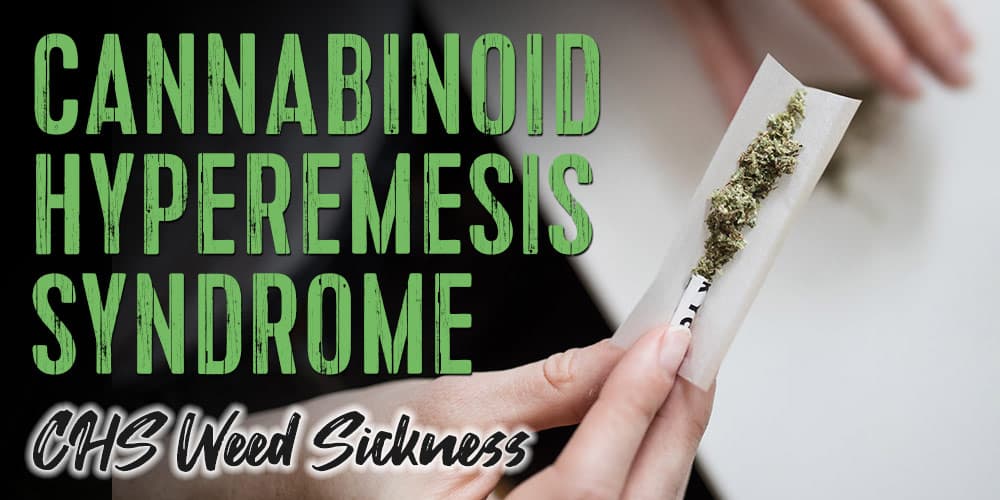
If you frequently smoke pot, or you’re a long time user of marijuana and have recently experienced abdominal pain, nausea, and vomiting, you might be suffering from Cannabinoid Hyperemesis Syndrome (CHS), sometimes referred to as weed sickness.
While cannabis is often considered a harmless drug by many people, there are known negative side effects of marijuana and it can be problematic for some individuals.
Ever increasing potent strains of cannabis or various forms of dab wax concentrates can lead to a heightened tolerance, dependence, and even addiction.
The National Institutes of Health (NIH) estimates that some 30 percent of individuals who use weed regularly may have some degree of marijuana use disorder.
Cannabinoid Hyperemesis Syndrome can be a particularly nasty sickness that makes some marijuana users feel continually ill, causing nausea, vomiting, and stomach cramps.
Many users believe these symptoms can be treated by ingesting more weed, which unfortunately continues the cycle of symptoms.
The condition may get serious enough that a person needs hospitalization, especially if other health complications arise from CHS weed sickness.
What is Cannabinoid Hyperemesis Syndrome?
Cannabinoid Hyperemesis Syndrome (CHS) is a relatively rare condition. But with the decriminalization and legalization of marijuana, CHS is becoming more common because of the increase in new people who are using cannabis. And some people are using more marijuana than they did before legalization.
In fact, marijuana is the most used drug in the United States, according to the National Institute on Drug Abuse (NIDA). Long-term marijuana users are at a higher risk of developing weed sickness than others.
Cannabinoid hyperemesis syndrome can lead to severe and prolonged bouts of nausea, vomiting, and abdominal pain.

Along with THC, cannabis has several active ingredients that bind to molecules in the brain that cause the “high” users experience.
The endocannabinoid system is quite complex and extends throughout the entire body to regulate or control memory, eating, metabolism, anxiety, and a host of many other functions.
Through the endocannabinoid system, ingredients in marijuana also bind to molecules in the digestive tract and can alter the time it takes to fully process food.
In addition, it affects the band of muscles that control the esophagus, which is the organ that allows food into the stomach.
We now know it is very possible that long-term marijuana use can change the way these bodily processes normally work.
Even if a person doesn’t think he or she uses a lot of marijuana compared to the others, using as little as once a day can still cause cannabinoid hyperemesis syndrome or weed sickness.
Related: Lexapro and Weed – Can I Mix Marijuana and Antidepressants?
What Causes CHS Weed Sickness?
Because cannabis is still considered a schedule I substance by the federal government, there’s been very little research into the long-term effects it has on the body. So, experts are still working to identify the exact cause of cannabinoid hyperemesis syndrome.
However, researchers know that pot acts differently in the brain than in the digestive tract.
In the brain, marijuana often helps prevent nausea and vomiting, which is why people undergoing chemotherapy or other issues that cause similar symptoms sometimes benefit from using the drug.
In the digestive tract, though, marijuana can have the opposite effect. At first, brain signals that ease nausea and vomiting are likely to override any digestive tract problems. However, heavy or long-term cannabis use combined with an increased tolerance or dependence can change that.
When certain receptors in the brain are altered from prolonged marijuana consumption, researchers believe signals in the digestive tract can take over and lead to stomach pain, nausea, and severe bouts of vomiting.
CHS weed sickness usually lasts as long as a person continues to use marijuana.
What are the Symptoms of Cannabinoid Hyperemesis Syndrome?
The first noticeable symptom of cannabinoid hyperemesis syndrome is what’s known as the prodromal phase of CHS, which results in early morning nausea, stomach pain, and some vomiting.
In the prodromal phase, symptoms may abate for a time and a person is able to keep a normal eating pattern. It is quite common for people to continue using marijuana because the condition hasn’t been diagnosed and they think it will help ease their symptoms.
The prodromal phase can last for months and, in some cases, years.
Next is what’s referred to as the hyperemetic phase, where the condition becomes more serious.
The hyperemetic phase of cannabinoid hyperemesis syndrome can lead to some of the following symptoms:
- Chronic nausea
- Ongoing bouts of vomiting
- Abdominal cramping and pain
- Decreased food intake
- Weight loss
- Severe dehydration from excessive vomiting
Though it may sound odd, a common thing for people with CHS weed sickness to do is take a lot of warm to hot showers.
Hot showers can help reduce the symptoms of nausea and vomiting because of the way heat affects the hypothalamus, which regulates body temperature and vomiting.
This phase can last until a person stops using marijuana.
Here’s the rub – many people wake and bake with an early morning smoke and then take a shower as they start their day. They wake up with morning sickness and associate pot with helping to relieve the nausea, yet fail to recognize that it was actually the shower that made them feel better and not the weed.

When this is the case, users with weed sickness continue using because they think it helps them feel better and never come to the realization that marijuana is making them sick.
Left untreated, other serious health complications can arise from this phase of cannabinoid hyperemesis syndrome, such as muscle spasms and weakness, heart rhythm abnormalities, kidney failure and, in severe cases, seizures, shock, and brain swelling.
In the recovery phase, CHS symptoms go away and a person regains a normal, healthy appetite, but symptoms tend to immediately reappear if a person returns to marijuana use.
How is Cannabinoid Hyperemesis Syndrome Treated?
Treatment approaches for cannabinoid hyperemesis syndrome will vary depending on the current progression of the condition.
For instance, in the beginning prodromal phase, simply avoiding marijuana use will make the symptoms subside and go away completely if an individual remains abstinent.
While giving up marijuana may be easy for some people, others will deny that weed is the problem and may suffer from an undiagnosed cannabis use disorder.
For people with a marijuana dependence or use disorder, addiction rehab treatment is very effective.
With even a relatively short period of sobriety and counseling approaches like Cognitive Behavioral Therapy (CBT) and Dialectical Behavior Therapy (DBT), people who undergo treatment give the brain time to balance its chemistry.
This allows the body time to return to normal functioning, while learning how to adjust their behavior and perspective in a healthy way.
In the hyperemetic phase, hospitalization may be required because dehydration can be incredibly dangerous if not monitored and treated.

Some of the treatment approaches for patients with CHS weed sickness can include the following:
- Intravenous fluids for dehydration
- Pain medications
- Medicines to decrease nausea and vomiting
- Frequent hot showers
- Proton-pump inhibitors to reduce and treat abdominal inflammation
- Benzodiazepines or sedatives may be prescribed to help ease anxiety that’s severe enough to worsen a person’s other symptoms
It’s important to see a doctor if a person has had severe vomiting for more than a day. It’s imperative to be completely honest about the duration and amount of marijuana the person has been using.
It can be extremely difficult for most people to understand that marijuana may be the problem that is causing the issues of cannabinoid hyperemesis syndrome.
Many people will be unwilling to even consider marijuana and CHS weed sickness is causing their symptoms in the beginning. However, if they can get past that denial, they will heal faster and feel better in no time.
Related Posts
- Lexapro and Weed – Can I Mix Marijuana and Antidepressants?
It’s no secret that people use marijuana to cope with stress or depression, but unlike…
- Fetal Alcohol Syndrome - What is It and What are the Symptoms?
Did you know that Fetal Alcohol Syndrome (FAS) is the leading cause of preventable birth…
- Dry Drunk Syndrome and What is a Dry Drunk?
The term Dry Drunk Syndrome, or simply Dry Drunk, refers to a person who quit…
